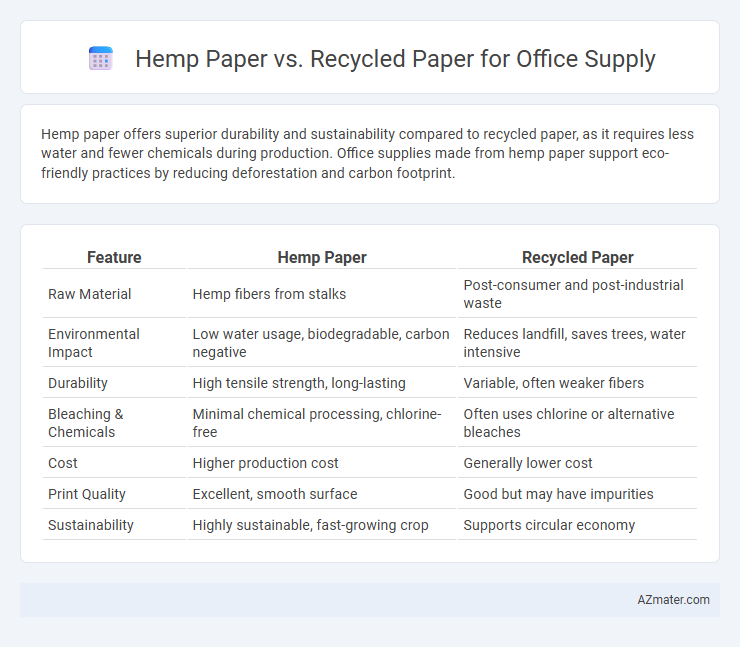Hemp paper offers superior durability and sustainability compared to recycled paper, as it requires less water and fewer chemicals during production. Office supplies made from hemp paper support eco-friendly practices by reducing deforestation and carbon footprint.
Table of Comparison
| Feature | Hemp Paper | Recycled Paper |
|---|---|---|
| Raw Material | Hemp fibers from stalks | Post-consumer and post-industrial waste |
| Environmental Impact | Low water usage, biodegradable, carbon negative | Reduces landfill, saves trees, water intensive |
| Durability | High tensile strength, long-lasting | Variable, often weaker fibers |
| Bleaching & Chemicals | Minimal chemical processing, chlorine-free | Often uses chlorine or alternative bleaches |
| Cost | Higher production cost | Generally lower cost |
| Print Quality | Excellent, smooth surface | Good but may have impurities |
| Sustainability | Highly sustainable, fast-growing crop | Supports circular economy |
Introduction to Sustainable Paper Choices
Hemp paper offers a sustainable alternative with faster growth cycles and higher fiber yield compared to traditional wood sources, reducing deforestation impacts in office supply production. Recycled paper minimizes waste by repurposing post-consumer materials, lowering energy use and greenhouse gas emissions associated with manufacturing. Choosing between hemp and recycled paper involves evaluating environmental footprints, cost efficiency, and availability for eco-conscious businesses seeking sustainable office solutions.
Overview: Hemp Paper and Recycled Paper
Hemp paper, derived from the fibers of the Cannabis sativa plant, offers superior durability, higher tensile strength, and a more eco-friendly production process compared to traditional wood-based recycled paper. Recycled paper, typically made from post-consumer waste such as office documents and newspapers, reduces landfill waste and conserves natural resources but may lack the strength and longevity of hemp paper. The environmental impact of hemp paper is lower due to its rapid growth cycle and minimal chemical use, making it an increasingly popular choice for sustainable office supplies.
Environmental Impact: Hemp Paper vs Recycled Paper
Hemp paper production requires significantly less water and fewer chemicals compared to recycled paper, resulting in a lower environmental footprint. Hemp plants grow rapidly and absorb more CO2 per acre than trees used for recycled paper, enhancing carbon sequestration benefits. Although recycled paper reduces landfill waste, hemp paper's biodegradability and sustainable farming practices provide a more eco-friendly alternative for office supplies.
Production Process Comparison
Hemp paper production involves harvesting fast-growing hemp plants that require fewer pesticides and less water compared to trees used in recycled paper. The hemp fibers are processed through chemical or mechanical pulping methods, producing strong, durable sheets with minimal environmental impact. Recycled paper relies on collecting, sorting, and de-inking used paper products, which consumes significant water and energy, and often results in fiber quality degradation after multiple cycles.
Durability and Quality in Office Use
Hemp paper offers superior durability and strength compared to recycled paper, making it ideal for frequent handling in office environments. Its long fibers create a smoother surface and higher tear resistance, enhancing print quality and longevity for important documents. Recycled paper, while environmentally friendly, tends to have shorter fibers that result in lower tear resistance and a rougher texture, which may affect print clarity and durability during regular office use.
Cost Analysis and Market Availability
Hemp paper typically costs 2-3 times more than recycled paper due to higher raw material and processing expenses, impacting office supply budgets seeking economical options. Recycled paper benefits from widespread market availability, dominated by established manufacturers and extensive supply chains, ensuring consistent and low-cost options for bulk purchasing. Hemp paper's niche market remains limited, with fewer suppliers and fluctuating availability primarily in eco-conscious sectors, restricting its immediate scalability for mainstream office use.
Printability and Office Equipment Compatibility
Hemp paper offers superior printability with its natural fibers providing a smooth surface that enhances ink absorption, reducing smudging and improving overall print clarity in office settings. Unlike recycled paper, hemp paper exhibits higher durability and fewer lint particles, ensuring better compatibility with office equipment such as laser printers and copiers, minimizing jams and maintenance issues. Recycled paper often varies in texture and quality, which can lead to inconsistent print results and increased wear on printing hardware over time.
Regulatory and Certification Considerations
Hemp paper benefits from certifications such as FSC and USDA Organic, ensuring sustainable sourcing and compliance with environmental regulations, while recycled paper often holds certifications like FSC Recycled and Blue Angel, indicating responsible material recovery and low environmental impact. Both types of paper must adhere to the EPA's guidelines for chemical content and emissions, with hemp paper offering lower chlorine and bleach usage compared to some recycled products. Office supply buyers should verify certifications and regulatory compliance to ensure product sustainability and alignment with corporate social responsibility goals.
Pros and Cons for Office Supply Purposes
Hemp paper offers superior durability and resistance to wear, making it ideal for high-quality office documents and long-term storage; its faster growth cycle ensures a more sustainable resource compared to wood. Recycled paper reduces environmental impact by reusing existing fibers, lowering energy consumption and landfill waste, though it often compromises on brightness and strength, potentially affecting print clarity and handling in office tasks. Cost efficiency favors recycled paper due to established supply chains, while hemp paper remains pricier but benefits offices seeking premium, eco-friendly paper with reduced chemical usage.
Conclusion: Choosing the Best Eco-Friendly Paper
Hemp paper offers superior durability, faster growth cycles, and requires fewer chemicals compared to traditional wood-based recycled paper, making it a highly sustainable option for office supplies. Recycled paper reduces landfill waste and energy consumption by repurposing post-consumer materials, offering a cost-effective and eco-conscious choice. Selecting the best eco-friendly paper depends on balancing durability, environmental impact, and budget, with hemp paper excelling in sustainability and recycled paper providing accessibility and affordability.

Infographic: Hemp paper vs Recycled paper for Office supply
 azmater.com
azmater.com